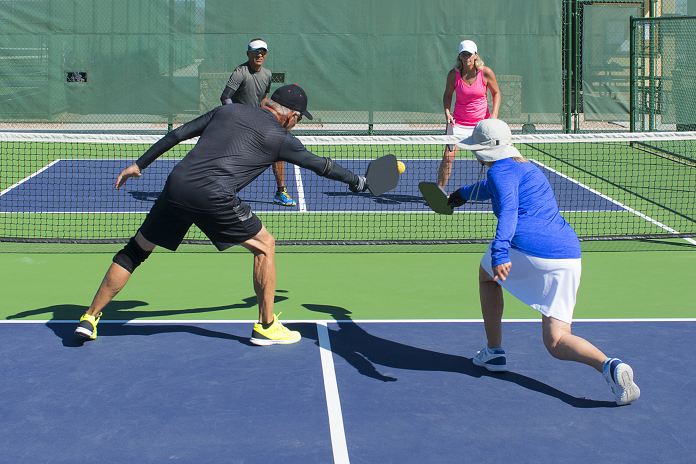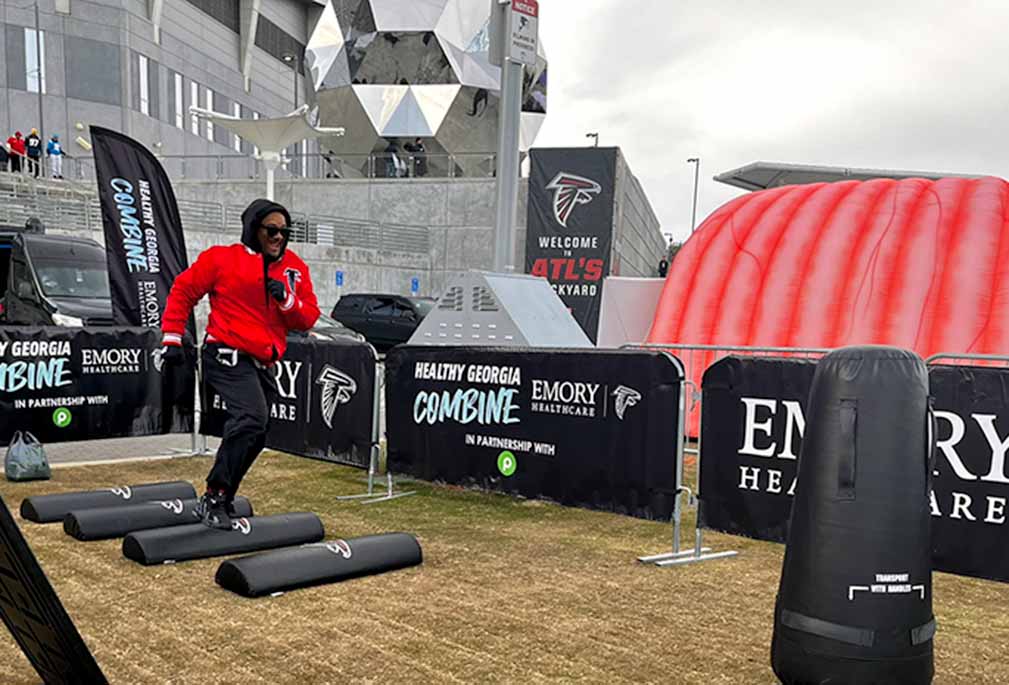What Athletic Trainers Do
Athletic trainers at Emory Healthcare are prepared to prevent, evaluate and treat injuries. They also have the experience needed to provide immediate emergency care and coordinate care for their patients’ health and well-being.
The American Medical Association recognizes athletic trainers as allied health care professionals. This term applies to many non-nurse and non-physician health care professionals. But like nurses and physicians, they use scientific principles and evidence-based practice to diagnose and treat injuries and illnesses. They also promote practices for a healthy lifestyle.
When injuries occur in sports, athletic trainers are the first responders. They prepare for when an everyday game becomes an emergency. And in that moment, they focus on what’s best for the individual athlete, not the team.
Athletic trainers have a wide range of responsibilities and skills. As an athletic trainer at a school, Chris plays many roles: sports medicine specialist, health educator, athlete advocate, first responder and community member. Chris explains, “We don’t just tape ankles, provide water and attend games. On any given day, we’re ready to react to a life-threatening situation.”
Chris also collaborates with coaches to educate them to spot signs of conditions like dehydration and heat illness. That way, they know when to have Chris evaluate an athlete. Chris also helps coaches modify drills based on athlete limitations.
 Athletic trainers like Chris have the unique perspective of being with patients through the full spectrum of care. Chris often acts as the first responder when someone gets hurt, evaluates the injury, helps the patient get additional medical care, facilitates rehabilitation, and sees them back out on the court or field.
Athletic trainers like Chris have the unique perspective of being with patients through the full spectrum of care. Chris often acts as the first responder when someone gets hurt, evaluates the injury, helps the patient get additional medical care, facilitates rehabilitation, and sees them back out on the court or field.
“We see them at their lowest and then at their highest when they’re back out there doing what they love,” said Chris.
In addition to supporting schools, athletic trainers work in a variety of roles. Some gain additional training and work as physician extenders in orthopaedics and sports medicine. Others see patients alongside adult and youth sports medicine physicians in a clinical practice. Still, others might bring their expertise to an industrial warehouse or law enforcement department.
A Game Save Worthy of Recognition
 To celebrate Chris’s dedication to his community and student athletes, he was named the 2023 Atlanta Falcons Athletic Trainer of the Year, presented by Emory Healthcare.
To celebrate Chris’s dedication to his community and student athletes, he was named the 2023 Atlanta Falcons Athletic Trainer of the Year, presented by Emory Healthcare.
Emory Healthcare has a special relationship with local sports teams as the official team healthcare provider of the Atlanta Falcons, Atlanta Braves, Atlanta Hawks and the Atlanta Dream.
“Chris really cares for the athletes,” said Greg Myer, director of the Sports Performance and Research Center at Emory Orthopaedics & Spine Center – Flowery Branch. Greg nominated Chris for the award and works with him to conduct research on topics like injury surveillance at local schools. “Chris represents the huge value athletic trainers bring to the health and safety of our athletes.”
But Chris’s recognition goes beyond this one story. It’s about his actions every day.
“It’s all about relationships,” said Chris. “I am a part of the West Hall community. I need to gain the trust of the coaches, the athletes and their parents.” Chris focuses on player health and safety to gain that trust. “They have their whole lives ahead of them, and we don’t want to do anything to jeopardize their future.”
Assistant soccer coach Marci Murphy agrees: “As a coach, it really makes us feel a whole lot better knowing that Chris is going to be there.”
Emory Sports Medicine
Emory Healthcare athletic trainers care for sports enthusiasts and athletes of all levels and ages.
 For high school and higher education athletes, Emory is one of the state’s largest employers of athletic trainers. “Our athletic trainers serve 27 schools in Georgia,” said Amy DeRosa, director of Emory Physical Therapy. “They support the daily health and safety of athletes across the metro Atlanta area every day.”
For high school and higher education athletes, Emory is one of the state’s largest employers of athletic trainers. “Our athletic trainers serve 27 schools in Georgia,” said Amy DeRosa, director of Emory Physical Therapy. “They support the daily health and safety of athletes across the metro Atlanta area every day.”
As part of an academic medical institution, Emory’s athletic trainers get the most up-to-date training and research available. Some even join the competitive athletic training residency program. And they all learn from one another. “Every time an athletic trainer activates the emergency action plan, our team reviews the event and shares it with the group as a learning experience,” said Amy.
Chris says just being on the field or court with the kids brings him joy.
“I tell people the best day on the job is when I do nothing because that means the players are healthy, the coaches are happy because their players are healthy and, most importantly, the parents are happy because their kids are safe.”
Because of their training and preparedness, athletic trainers can meet a volleyball court scare with well-timed care. Whether our athletic trainers are helping athletes on the field or treating patients in an office, they care for all kinds of sports injuries and situations.
Professional and youth athletes rely on us, and so can you. Learn more about Emory’s sports medicine and youth sports medicine programs.


 Athletic trainers like Chris have the unique perspective of being with patients through the full spectrum of care. Chris often acts as the first responder when someone gets hurt, evaluates the injury, helps the patient get additional medical care, facilitates rehabilitation, and sees them back out on the court or field.
Athletic trainers like Chris have the unique perspective of being with patients through the full spectrum of care. Chris often acts as the first responder when someone gets hurt, evaluates the injury, helps the patient get additional medical care, facilitates rehabilitation, and sees them back out on the court or field.  To celebrate Chris’s dedication to his community and student athletes, he was named the 2023 Atlanta Falcons Athletic Trainer of the Year, presented by Emory Healthcare.
To celebrate Chris’s dedication to his community and student athletes, he was named the 2023 Atlanta Falcons Athletic Trainer of the Year, presented by Emory Healthcare.  For high school and higher education athletes, Emory is one of the state’s largest employers of athletic trainers. “Our athletic trainers serve 27 schools in Georgia,” said Amy DeRosa, director of Emory Physical Therapy. “They support the daily health and safety of athletes across the metro Atlanta area every day.”
For high school and higher education athletes, Emory is one of the state’s largest employers of athletic trainers. “Our athletic trainers serve 27 schools in Georgia,” said Amy DeRosa, director of Emory Physical Therapy. “They support the daily health and safety of athletes across the metro Atlanta area every day.” 


